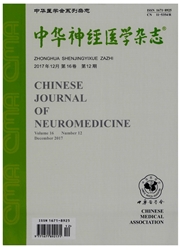

 中文摘要:
中文摘要:
脑小血管病是指各种病因影响脑内小动脉、微动脉、毛细血管、微静脉和小静脉所导致的一系列临床、影像、病理综合征。患者临床表现为认知功能障碍、步态异常、构音障碍。影像学表现包括脑白质病变、微出血、腔隙性脑梗死、扩大的血管周围间隙和脑萎缩。脑小血管病的病因及发病机制复杂多样。近年来有很多关于遗传性和散发性脑小血管病的遗传学研究,目前已经发现了一些脑小血管病的单基因病因。单基因遗传性脑小血管病是以脑小血管病影像学表现为共同特征,多系统共同受累的单基因遗传性疾病。本文总结了相对常见的单基因遗传性脑小血管病的遗传方式、临床特点、影像学表现、病理特点及主要基因特征,并针对其他常见的散发性脑小血管病的遗传机制研究进展进行综述。
 英文摘要:
英文摘要:
Cerebral small vessel diseases refer to a group of clinical, radiological, or pathological phenomenas with various aetiologies that affect the small arteries, arterioles, capillaries, venules and small veins of the brain. Patients may manifest as cognitive dysfunction, abnormal gait, and/or dysarthria. Cerebral small vessel diseases can be visualized as lacunar infarcts, white matter lesions, cerebral microbleeds, enlarged perivascular spaces and brain atrophy on neuroimaging studies. Its eiology and pathogenesis are complex and complicated. In the recent years, with advances in molecular genetics and studies on hereditary and sporadic cerebral small vessel diseases, several monogenic conditions involving cerebral small vessels have been identified. Monogenic cerebral small vessel disease is a kind of single-gene inherited disease which manifests clinical spectrums involving multiple systems, and cerebral small vessel disease is a common characteristic. Here, we summarized the inheritance patterns, main clinical findings, neuroimaging findings, pathological features and main geneteic traits in monogenic cerebral small vessel disease, and reviewed the genetics mechanism and advance studies of some common forms of sporadic cerebral small vessel disease.
 同期刊论文项目
同期刊论文项目
 同项目期刊论文
同项目期刊论文
 期刊信息
期刊信息
